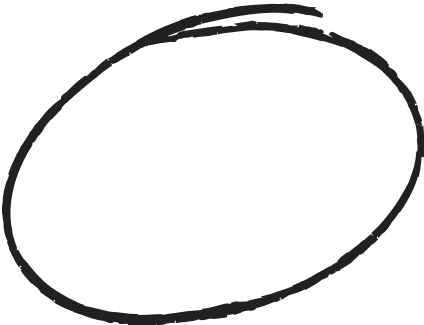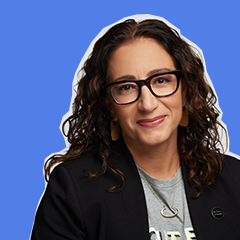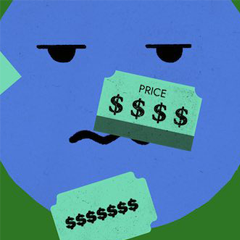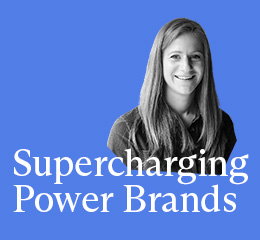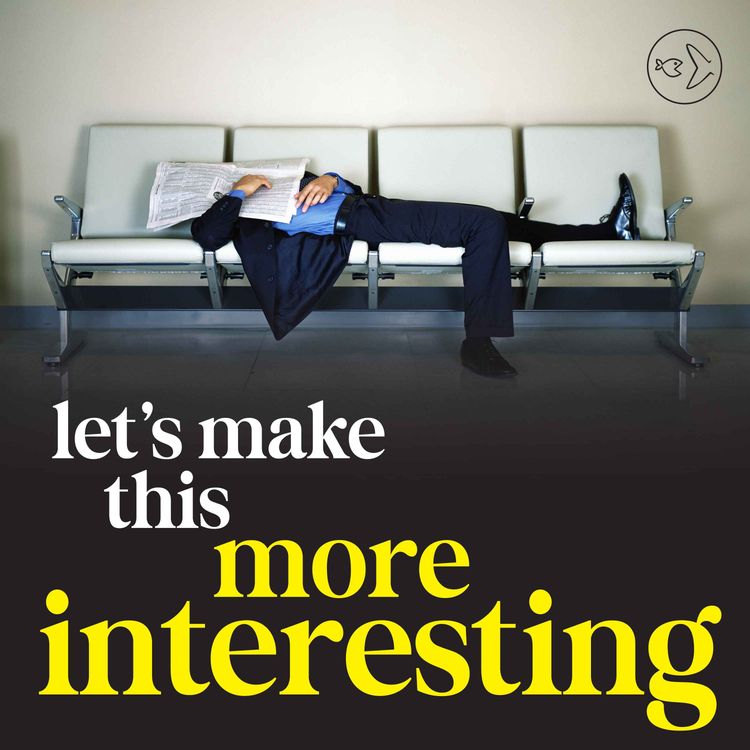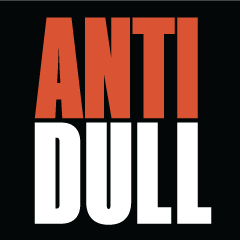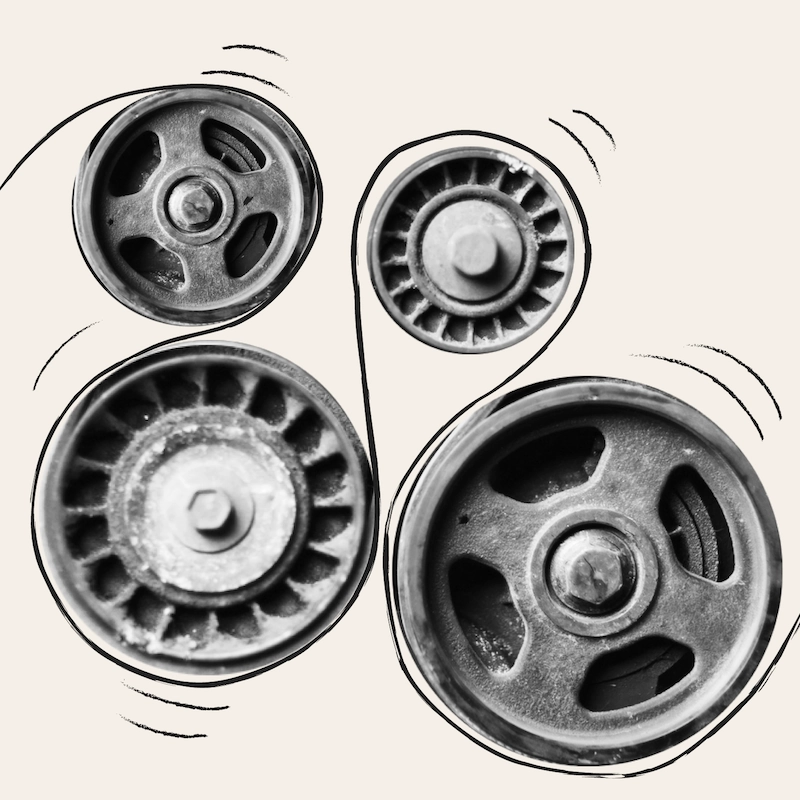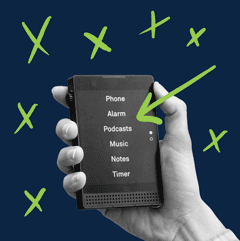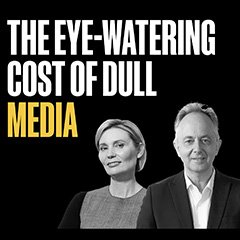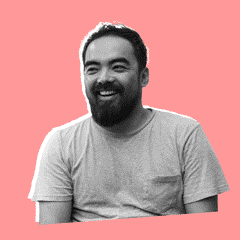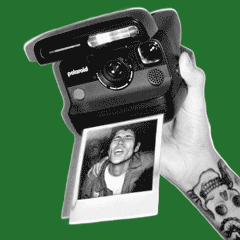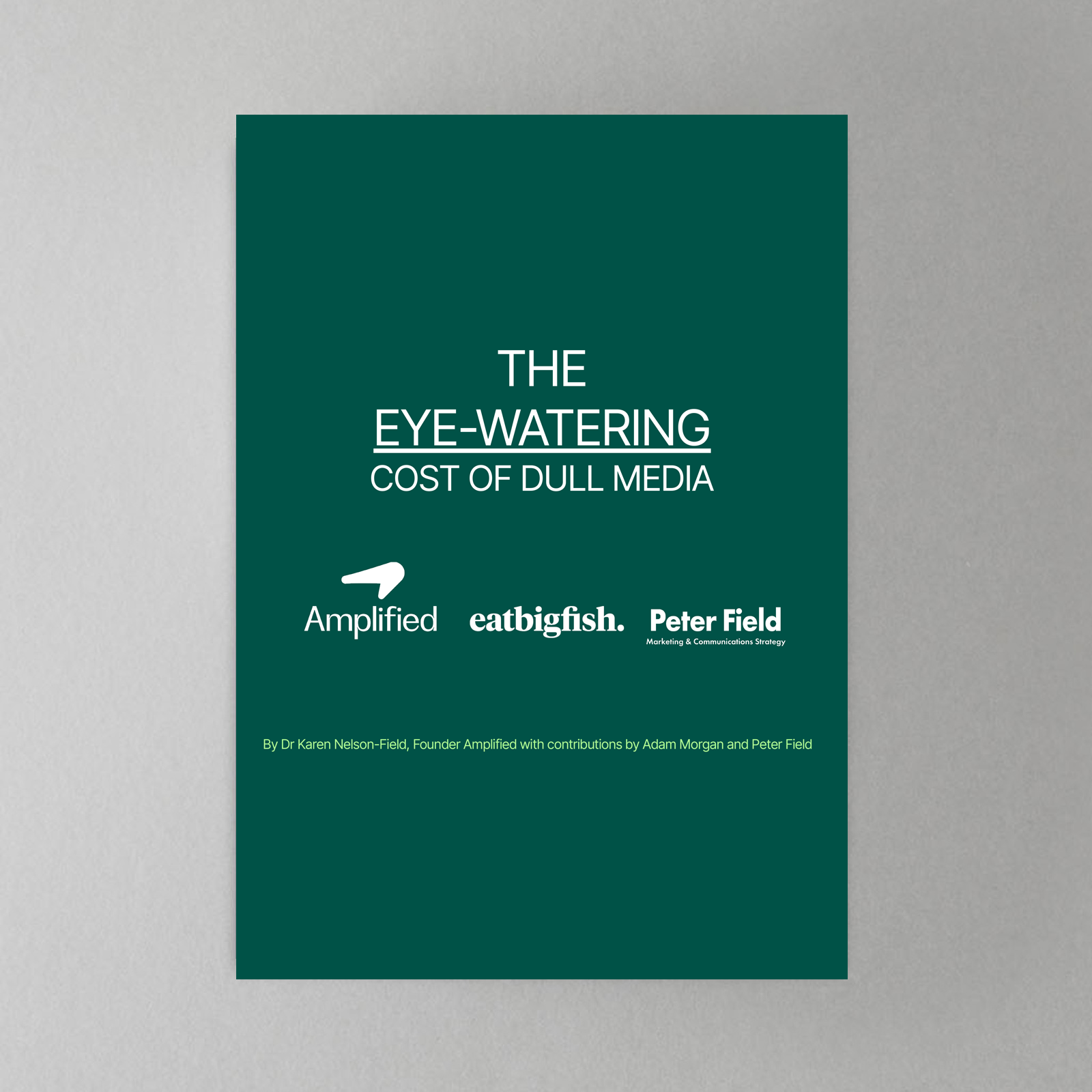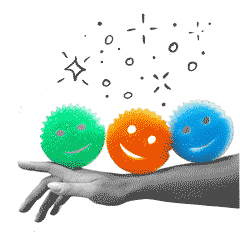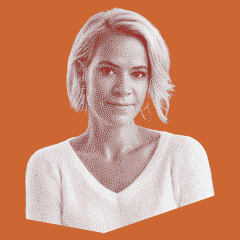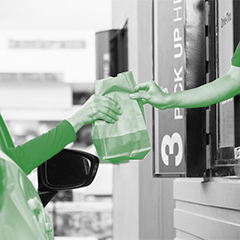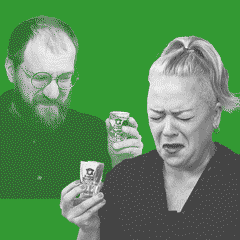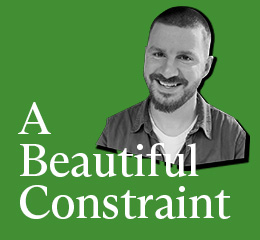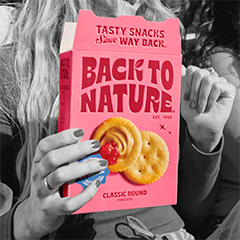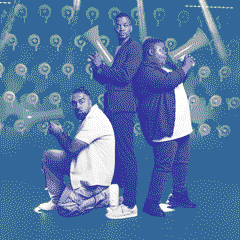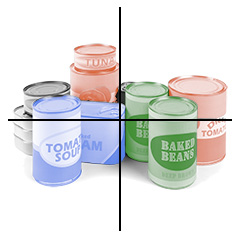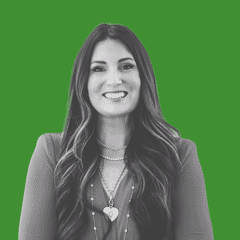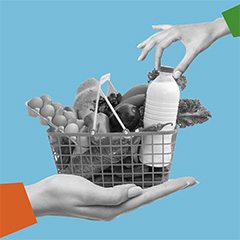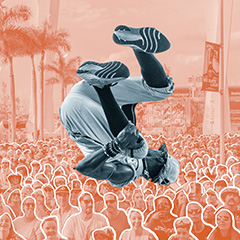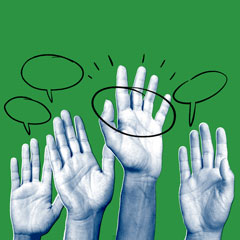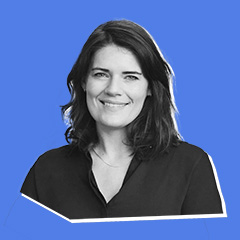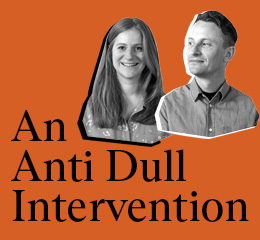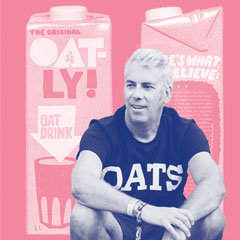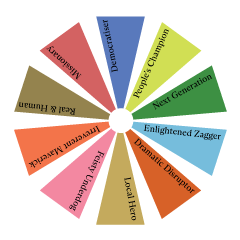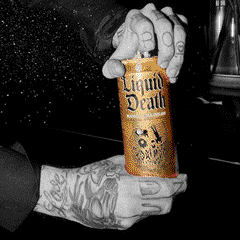Taco Bell: “We're a taco in a burger world.”
Taco Bell: “We're a taco in a burger world.”
Defying conventions at every turn, inventor of not only the “Fourthmeal” but also free refills, Taco Bell has been challenging the status quo of the QSR category since its founding in 1962. Jenna Stephan spoke with Ashley Prollamante, Senior Director, Brand Creative Strategy and Nicole Weltman, Head of Social at Taco Bell to find out how the brand consistently reinvents itself while staying true to its core.
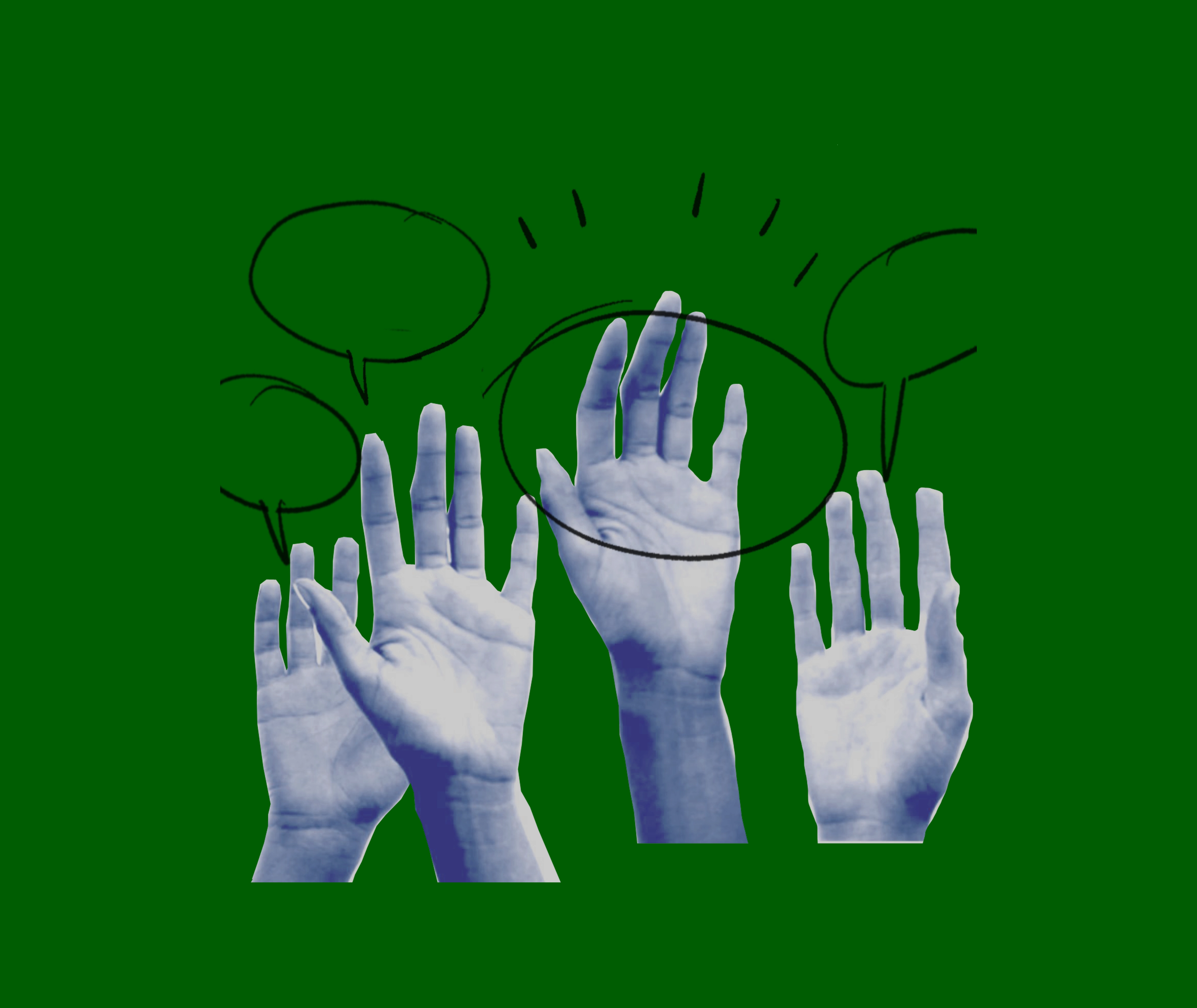
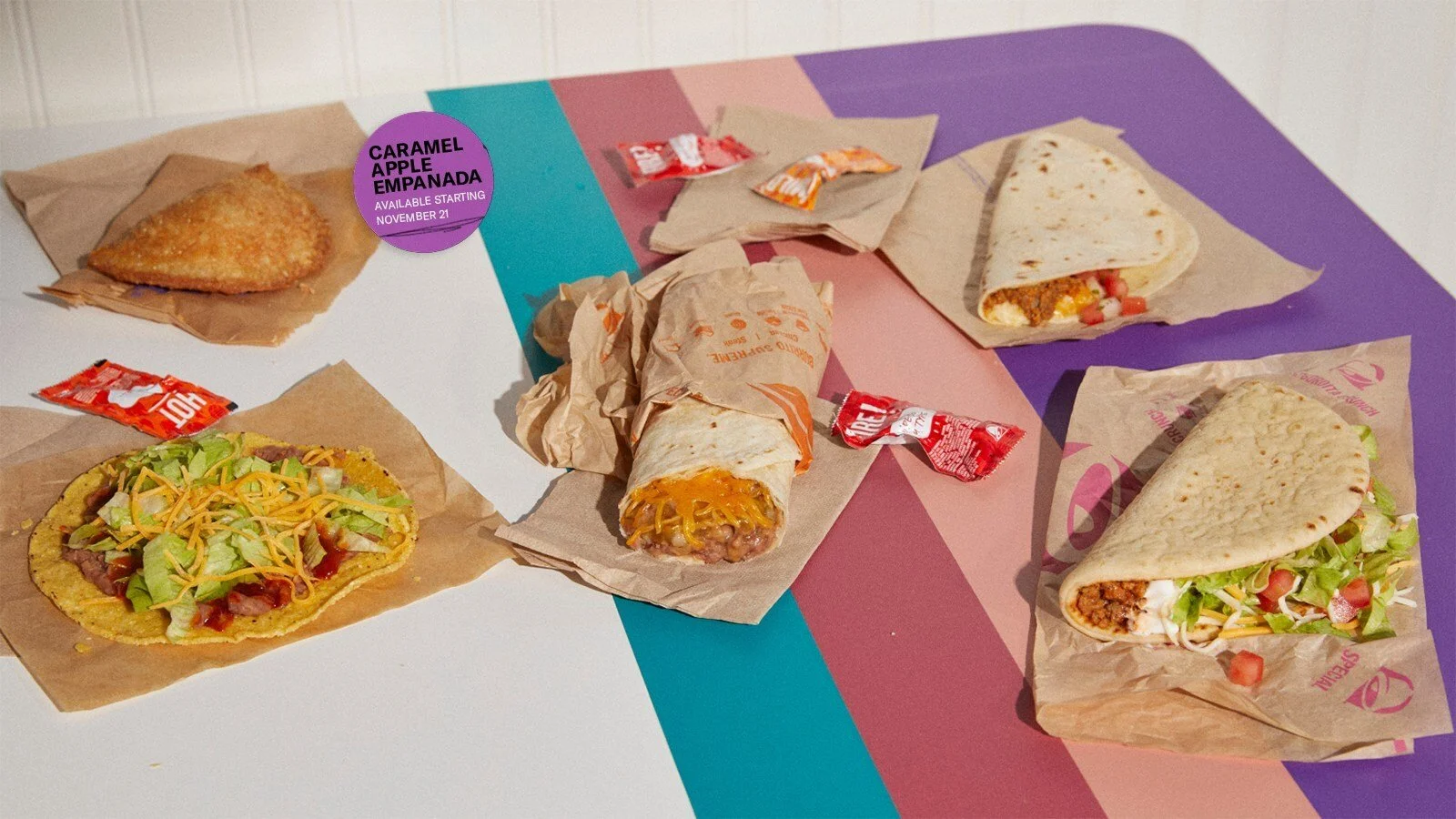

How would you describe Taco Bell’s tone of voice? What makes you distinctive?
Ashley Prollamante: Our character is the life of the group chat. Everyone knows this person who is the glue and the spark plug of your best group chats. It is flexible because that person can be different to everyone. They can look different, have different interests and passions and hobbies and even personalities, but they have some core attributes that make them able to pull off that heavy lift of being that person. And our social team is now taking this character, this life of the group chat, and asking, ‘How does the life of the group chat manifest in social?’ Our digital team that's working on our app overhaul, is asking ‘What does this mean in the digital space, in the digital ordering interface?’ and ‘How does the life of the group chat manifest in that space?’ which probably looks a little different to each channel owner.
We have three very specific points of difference. One is Mexican-inspired and I don't think we're doing the best job at leaning into this aspect of our heritage as hard as we can. So, there's a lot of upside there. The second one is innovation and flat-out creativity. Activations like Live Más Live are where we really put that creativity on display. Then the third one is value: how can we be really innovative in the value space? An example is that Taco Bell invented free refills. And that defied convention at the time in the value space. And that is the ambition that we're constantly chasing as it relates to value.
Nicole Weltman: We’re different, but not alone. For quite some time, we had a list of what our tone was, and it was a lot of characteristics that are still true. There's an irreverence. There's a huge self-awareness, because if you're different, but not alone, you have to be self-aware, right? There's wit and being in on the joke. It’s not bullying, we're in on this joke together and we hold up this mirror to our community. So, all of that is true, but those characteristics are like planets revolving around the sun of: different, but not alone.
When you're in advertising, branding and social, there is this tension, especially on social, where we need to figure out how to take this format and make it uniquely ours. I am not saying look like everyone else, sound like everyone else. I'm saying use the format. So that is where a lot of our social strategy was birthed from – different, but not alone. A colleague of mine would talk about how the energy in the room shifts when you put a bag of Taco Bell on a table at a party, or when you tell someone you work at Taco Bell, and all of a sudden, they want to share their favorite menu item with you. It's like, ‘I am unique, because I like Taco Bell compared to the rest of QSR or the rest of America.’ Or when someone loves an obscure band, ‘I'm special because I like my obscure band, but I want to find my people and geek out with them about this obscure band.’ That’s different but not alone.
Could you just talk a little bit about the core principle behind Taco Bell's brand voice, and how you ensure that it's consistently reflected across all of the various things that you do?
Ashley Prollamante: There's a science of chaos at Taco Bell - we can be disciplined but also be unconventional which are two things that are at odds with each other. But as we've repositioned the brand and gotten our groove, we rally behind this saying, ‘Our brand is so much better in the hands of our fans.’ So, we're in this era where creators are running with our brands, but also fans, because it's really their voice that drives us and we’re putting our trust in them. If you look at the Doja Cat work with Mexican pizza, she did an Instagram Live, and I was literally terrified. We didn't know what she was going to say, but I think in hindsight, that was a really important lesson for us. Letting her go unscripted resonated with our cult, because they could relate to her as a true fan. They're like, ‘Yeah, where is Mexican pizza? Freaking bring it back.’ So while it may show up as negative sentiment, there's passion behind that. That's been a learning for us as we've navigated balancing our tone and who we are but also embracing the voice of our fans. The brand has to be flexible, and our fans allow us to do that.
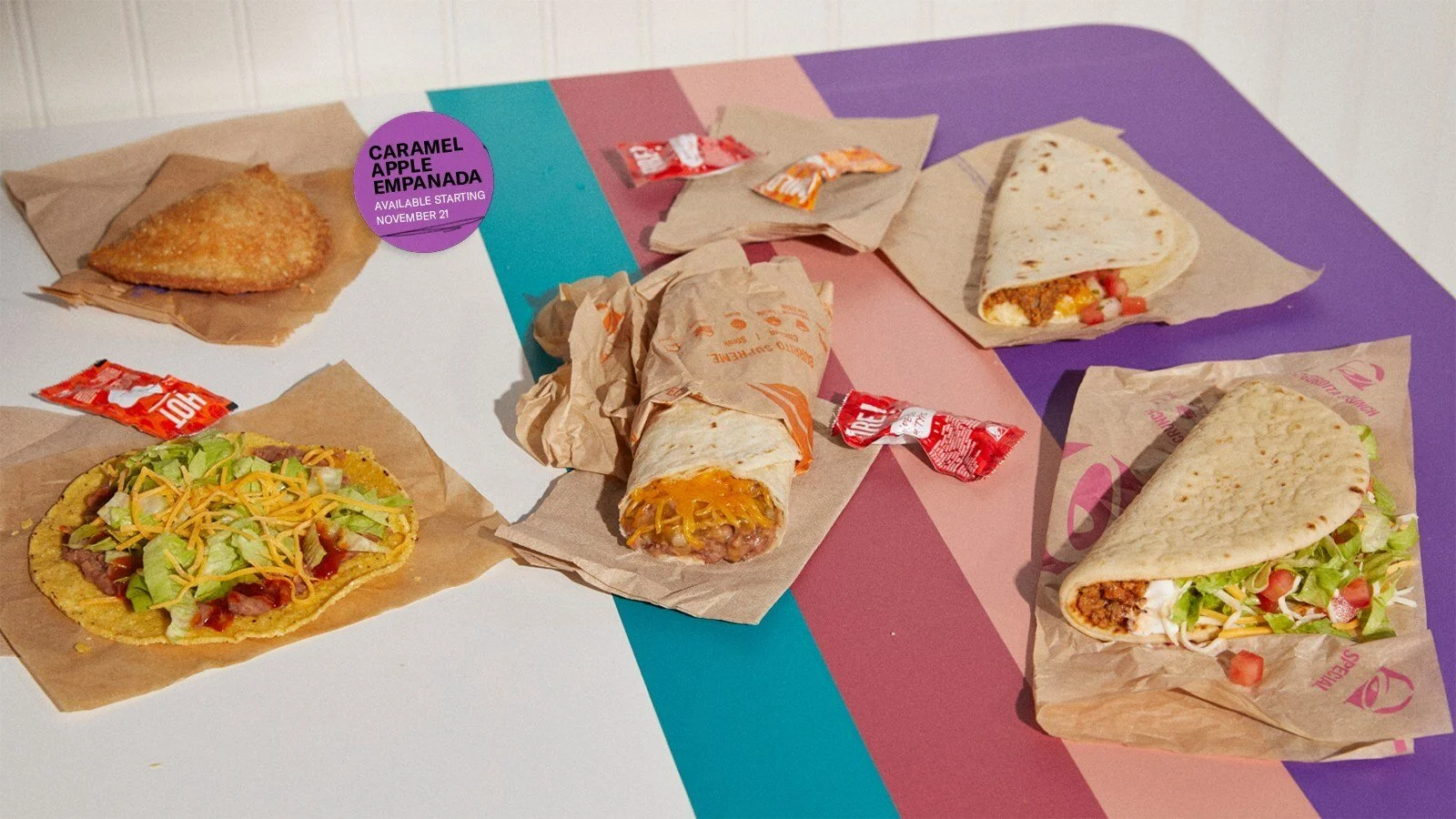
You have such an engaged audience, how do you decide where to show up for them?
Ashley Prollamante: We would never say we're culture followers, instead that we show up in places that our fans take us to and that our cult belongs to. There are choices that we make like we don't really belong here or there, but for others we're already here, so let's lean into that. We look to our mission and our muse and some of our principles like spotlighting the undiscovered, for example, which is when we think about our founder Glen Bell – he didn't invent tacos, but he democratized them and showed them off to a lot more people. That's more how we think of ourselves. We use our footprint as a mass brand to hold up people that are doing things that we think are interesting. At the most functional level, Taco Bells are sometimes where people try flavors, forms and peppers for the very first time, for example ‘Oh, I tried Sriracha for the first time at a Taco Bell.’ You can't underestimate our impact in that way, just based on our scale alone. But we didn't invent Sriracha. So, there is a bit of a hitching onto our fans that are going interesting places.
Nicole Weltman: So, we were having a lot of internal debate about, how do you chase a trend and use a trending sound on TikTok but still show up in a way that is reflective of the community and shows that we’re in on the joke. And there was this trending sound, probably nearly two years ago, but it was cheerleaders chanting, ‘Whatcha looking for?’, and someone on our content team used that sound to say the same five ingredients remixed, because, that’s us, right? And that was the first time that we really hit the bullseye of using this trending sound early, but it was so uniquely Taco Bell. Like, thanks sound for enhancing something that we have to say. It was not depleting or competing and so this was perfect. So, we can take these trending sounds, but not lose sight of who we are, what we have to say.
It should not be one person's decision what content we do. We have a group of people that I call ‘chronically online’, which is becoming table stakes for your social media team. To be chronically online is to understand what is rising to the top of the internet that day. It's a slice of the zeitgeist of what's happening today that is on everyone's radar. They live and breathe the internet. So, we will talk about where we are with the trend, but if I can't get a piece of content made by x time, we'll move on. If we can't figure it out, and if it feels like we're forcing it, or our content strategy doesn't make sense, the ideas aren't pouring out of us, then we will move on. We have filters and questions that we ask ourselves to help make that decision, but it is pretty much a decision by committee.
There are times where we've spent a lot of money on a celebrity and the content that we put on their channel is gangbusters for our brand. But on Taco Bell organic, we posted something featuring this same celebrity, and then a week later, we posted a very similar asset in length, copy, time of day, of our CMO, Taylor Montgomery, talking from Live Más Live about Cheez-Its inside a Crunchwrap, and it outperformed the celebrity by 2x. That's crazy. Why? Because it's us. Why are you following Taco Bell? To see stuff about Taco Bell. Sometimes it's that simple. It's the stuff that is so ‘us’ that is driving the news and the buzz. It's very basic, but you can get so distracted by everything that's going on, the echo chamber that is advertising, AI, do this, do that, work with celebrities, right? Sometimes you just need to be you. So, now, we use it as a reference point internally – should we post about this organically? Taylor Montgomery outperformed the celebrity. That's part of taking what the internet gives you: your audience is telling you what content they want to see.
What QSR category norms is Taco Bell trying to push back on? How does your slogan Live Más help you do that?
Ashley Prollamante: This is another weird paradox for the brand, because we are inherently a Challenger brand in that we are the other choice. We're a taco in a burger world. In the QSR category, we are smaller, especially when you start looking at it globally. But on the other hand, we like to say we're a category of one. We often see in focus groups where people are asked to clump similar brands together that Taco Bell was alone. It's on its own, because it is a bit of a snowflake.
We refer to most of our previous brand work as ‘Live Más 1.0’. Over the last decade, we were trying to cement ourselves as rebellious. We break convention, we do things differently. And that inherently was a bit of a positioning trap. To position yourselves like that, you have to have an enemy, versus when you lean more into just being unconventional. We do things our way, and we’re starting from a place of anything is possible. Live Más 2.0, where we are today, is a bit of a different look, and it doesn't require an enemy. Actually, maybe the enemy is just boring, but I think that's more of the season that we're moving into.
Live Más 1.0 was about establishing ourselves as more of a lifestyle brand and not just a cheap fast food brand. The era before that was about heavy value, heavy discounting, and it was what was happening in the category. However, it wasn’t inspiring for us as a brand to look at the category. Even though we made some incredible work in that in that era, launching breakfast, the Ronald McDonald campaign, when you still play that playbook, it keeps you in the category. And other brands started to use that same playbook. You started seeing snarky Wendy on Twitter, and all these different QSRs basically taking shots at each other. So, that playbook that was once disruptive, was now ubiquitous. It just became not distinctive anymore, and literally, our life blood is distinctiveness. How do we continue to be different?
How are you positioning yourself with Live Más 2.0? Where are you finding your inspiration?
Ashley Prollamante: The cultural rebel is our muse. It's a mindset that exists across lots of different demographics. It's generation agnostic. There's a little bit of art and science to how we think about it. The science that we're trying to be really anchored in is that in order to keep growing, we need to be more relevant to more people. It’s this paradox of be more broadly appealing and yet be super distinctive. It’s a really tough needle to thread, but that's where cultural rebel becomes important. Just because we need to sell chicken to a shitload of people, doesn't mean we can't do it in a way that is interesting and aspirational and has a point of view that's really pointed. We have a really broad, robust group of consumers that we need to win over, hundreds of millions of people, but we need to talk to them in a really specific way that makes them think that we're interesting.
Nicole Weltman: The memes that we create that are most successful are literally things that we see in our comment section all the time, and then we serve them back up in just a little bit of a creative, more curated way. But the heart of what we're saying is what people are saying to us. And that is a blessing. Not every brand gets a comment section so rich that it can lead to briefs for content, but every brand could come close or use the comments in their category as a brief. It's about taking what the internet gives you. And taking what the audience, the community gives you, is a principle that we've had that has been a huge, strong star for us.
Tell us about your audience. Who are they?
Ashley Prollamante: We're a youth brand and always have been. They define what culture is and what it looks like. If you want to be relevant in culture, you have to be in tune with whoever the youngest people are at the time. What I was more concerned about, that I could feel coming out of COVID as we started to get really slapped in the face by Gen Z, was that we had to make sure that they cared about us and every brand was playing with the exact same set of insights about them. That was terrifying to me, and that's what I started to see play out in the work, across not just our category, but honestly, every brand. So for us, it was really more, what about Gen Z is a unique point of difference that's relatable to only us, that we can leverage? And that's really where we started to think about: yes they're really diverse, but there's this really, uncanny blessing, honestly, that in this generation, you're starting to see this really complex intersection of identities in terms of ethnicities. My son is Filipino, Colombian and Italian, which is a perfect expression of what this generation looks like. And there is this tension of wanting to preserve some of that in them, but be this really modern, remixed version of that. What an incredible parallel to our brand, the fact that we have a Spanglish tagline. So, at one point we were like, ‘Should we let go of Live Más?’ But this was such an important moment in time to say, ‘No, actually, we need to really double down on that.’ Live Más is this fusion element of our brand and we decided to really lean into the Mexican-inspired strand of our DNA and figure out what to do with that, because it's really important.
A lot of your content is very much of the moment. How do you make sure you stay on top of everything?
Nicole Weltman: All of the trending content goes to our Taco Bell Newsroom. The Newsroom runs at a few different speeds, and we bring different people together based off what the speed is. So, if it’s the trending content and weekly brainstorms for content, then that is similar to a writer's room. It's the creative brainstorming about what are we making this week? What's trending this week? People bring forward what they're seeing from their unique corner of the internet, and we make a plan, and we go, and we execute. Then there is more of a long-term brainstorm, which may not happen every week, but it’s like instead of writing an episode, you're writing your season arc. If you want to take the writer's room analogy, it's the bigger white space, the things that we want to get after for some bigger ideas. And sometimes we bank them. And we have a bank of ideas, so that if sales are soft, or we haven't popped off in culture in a minute (and you can feel it in the building when we haven't been in the news in a minute), then we have ideas about what cool things that we want to do. And that is harder to continue to prioritise, because we're chasing the weekly stuff, so sometimes bringing in different minds and people helps. There's actually a really tactical version of the bank of content that is about sales-driving ideas. So like, if CRM is going to make this offer, this is what the content looks like. Our sales can be really cyclical, and we see them trend to either, when our menu is turned over or when we're in the news, and when our menu turns over, it generates news, so those things are related. So, that's why it's a newsroom, because it's meant to solve for when we might need bursts of news, at what level and with whom.
You’ve taken some big risks when it comes to your social strategy. Can you tell us about how you challenged the trademark on Taco Tuesday and how you mitigated those risks in your campaign ‘Freeing Taco Tuesday’?

Nicole Weltman: I felt like we were walking on a tightrope with the Taco Tuesday work. Our fear was comments like, ‘You are Goliath. You went after “David” Taco John's (who also was a Goliath, going after David's mom and pop shops), and you did it just so that you can advertise on Tuesday.’ But really, no one should have [a trademark on Taco Tuesday]. This is crazy for everyone, mom and pop, big, small, it doesn't matter, and if you know about trademark law, it is just a pure violation. If something is nomenclature, so if you look at the number of hashtag Taco Tuesdays garnered alone, there's no way this should be trademarked. But you have to really understand trademark law to understand what we were doing. So, we used trademark talking heads and law-fluencers to make it make sense on TikTok. They had to lead, and we took some of those videos and sent that to the press. So, it was very orchestrated. We are a courageous brand and we don't operate from a place of fear of getting cancelled. But if you don't think through all of the different scenarios, you're not being a good stakeholder. You're not being a good [brand] steward. What I mean is, who should lead? Who should authenticate? How should the information get to the consumer, so that they really understand and there's no room for misinterpretation?
There was a lot of time and care that went into the briefing. It was really intricate and full of law and our actual filing. We also had a piece of creative that was our filing, so people could green screen to explain it. We also had the trademark lawyer review the content, just for accuracy, because it is so nuanced. I feel like we spent months in a room figuring that out, and we cracked it, and then it was great.
How do you make decisions on what to focus on next for Taco Bell?
Nicole Weltman: We have this thing called Ring the Bell: it’s where our innovation, share and transaction growth are going to come from for the next few years. So, there's a very clear blueprint. We all know what percent we are trying to drive for sales growth to be successful this year and our CMO starts every all-hands meeting with ‘What's the magic number?’ We are all really rooted in business data and there's a very clear north star that everyone in the marketing team knows. And then there are the initiatives that sit underneath that, so we know we need to grow chicken. We know we need to grow value. Everyone in the building knows it. We start our yearly planning with our three big goals, which are rooted in consumer barriers and they’re in the voice of the consumer. So, one is that Taco Bell has lost its way on value. So, every value campaign has to come back and address that problem. We all know the three big things we're trying to unlock this year, and then from there you get a tonne of autonomy.
So, we have our three big things, one of which is value. Then we say, big picture, ‘What is the best way to win value? What is the best way to address this consumer barrier?’ Actually, value doesn't belong in the newsroom. We're not going to try to insert value into real time trending content. It's more at the brand level, so what's a great way to bring the value message to a really cynical and discerning Gen Z audience? Influencers. Value has much more of an influencer and paid media spend and is not in our organic strategy. We augment all of the things we're trying to get after, against all of the tools in our toolbox.
How would you describe Taco Bell’s tone of voice? What makes you distinctive?
Ashley Prollamante: Our character is the life of the group chat. Everyone knows this person who is the glue and the spark plug of your best group chats. It is flexible because that person can be different to everyone. They can look different, have different interests and passions and hobbies and even personalities, but they have some core attributes that make them able to pull off that heavy lift of being that person. And our social team is now taking this character, this life of the group chat, and asking, ‘How does the life of the group chat manifest in social?’ Our digital team that's working on our app overhaul, is asking ‘What does this mean in the digital space, in the digital ordering interface?’ and ‘How does the life of the group chat manifest in that space?’ which probably looks a little different to each channel owner.
We have three very specific points of difference. One is Mexican-inspired and I don't think we're doing the best job at leaning into this aspect of our heritage as hard as we can. So, there's a lot of upside there. The second one is innovation and flat-out creativity. Activations like Live Más Live are where we really put that creativity on display. Then the third one is value: how can we be really innovative in the value space? An example is that Taco Bell invented free refills. And that defied convention at the time in the value space. And that is the ambition that we're constantly chasing as it relates to value.
Nicole Weltman: We’re different, but not alone. For quite some time, we had a list of what our tone was, and it was a lot of characteristics that are still true. There's an irreverence. There's a huge self-awareness, because if you're different, but not alone, you have to be self-aware, right? There's wit and being in on the joke. It’s not bullying, we're in on this joke together and we hold up this mirror to our community. So, all of that is true, but those characteristics are like planets revolving around the sun of: different, but not alone.
When you're in advertising, branding and social, there is this tension, especially on social, where we need to figure out how to take this format and make it uniquely ours. I am not saying look like everyone else, sound like everyone else. I'm saying use the format. So that is where a lot of our social strategy was birthed from – different, but not alone. A colleague of mine would talk about how the energy in the room shifts when you put a bag of Taco Bell on a table at a party, or when you tell someone you work at Taco Bell, and all of a sudden, they want to share their favorite menu item with you. It's like, ‘I am unique, because I like Taco Bell compared to the rest of QSR or the rest of America.’ Or when someone loves an obscure band, ‘I'm special because I like my obscure band, but I want to find my people and geek out with them about this obscure band.’ That’s different but not alone.
Could you just talk a little bit about the core principle behind Taco Bell's brand voice, and how you ensure that it's consistently reflected across all of the various things that you do?
Ashley Prollamante: There's a science of chaos at Taco Bell - we can be disciplined but also be unconventional which are two things that are at odds with each other. But as we've repositioned the brand and gotten our groove, we rally behind this saying, ‘Our brand is so much better in the hands of our fans.’ So, we're in this era where creators are running with our brands, but also fans, because it's really their voice that drives us and we’re putting our trust in them. If you look at the Doja Cat work with Mexican pizza, she did an Instagram Live, and I was literally terrified. We didn't know what she was going to say, but I think in hindsight, that was a really important lesson for us. Letting her go unscripted resonated with our cult, because they could relate to her as a true fan. They're like, ‘Yeah, where is Mexican pizza? Freaking bring it back.’ So while it may show up as negative sentiment, there's passion behind that. That's been a learning for us as we've navigated balancing our tone and who we are but also embracing the voice of our fans. The brand has to be flexible, and our fans allow us to do that.

You have such an engaged audience, how do you decide where to show up for them?
Ashley Prollamante: We would never say we're culture followers, instead that we show up in places that our fans take us to and that our cult belongs to. There are choices that we make like we don't really belong here or there, but for others we're already here, so let's lean into that. We look to our mission and our muse and some of our principles like spotlighting the undiscovered, for example, which is when we think about our founder Glen Bell – he didn't invent tacos, but he democratized them and showed them off to a lot more people. That's more how we think of ourselves. We use our footprint as a mass brand to hold up people that are doing things that we think are interesting. At the most functional level, Taco Bells are sometimes where people try flavors, forms and peppers for the very first time, for example ‘Oh, I tried Sriracha for the first time at a Taco Bell.’ You can't underestimate our impact in that way, just based on our scale alone. But we didn't invent Sriracha. So, there is a bit of a hitching onto our fans that are going interesting places.
Nicole Weltman: So, we were having a lot of internal debate about, how do you chase a trend and use a trending sound on TikTok but still show up in a way that is reflective of the community and shows that we’re in on the joke. And there was this trending sound, probably nearly two years ago, but it was cheerleaders chanting, ‘Whatcha looking for?’, and someone on our content team used that sound to say the same five ingredients remixed, because, that’s us, right? And that was the first time that we really hit the bullseye of using this trending sound early, but it was so uniquely Taco Bell. Like, thanks sound for enhancing something that we have to say. It was not depleting or competing and so this was perfect. So, we can take these trending sounds, but not lose sight of who we are, what we have to say.
It should not be one person's decision what content we do. We have a group of people that I call ‘chronically online’, which is becoming table stakes for your social media team. To be chronically online is to understand what is rising to the top of the internet that day. It's a slice of the zeitgeist of what's happening today that is on everyone's radar. They live and breathe the internet. So, we will talk about where we are with the trend, but if I can't get a piece of content made by x time, we'll move on. If we can't figure it out, and if it feels like we're forcing it, or our content strategy doesn't make sense, the ideas aren't pouring out of us, then we will move on. We have filters and questions that we ask ourselves to help make that decision, but it is pretty much a decision by committee.
There are times where we've spent a lot of money on a celebrity and the content that we put on their channel is gangbusters for our brand. But on Taco Bell organic, we posted something featuring this same celebrity, and then a week later, we posted a very similar asset in length, copy, time of day, of our CMO, Taylor Montgomery, talking from Live Más Live about Cheez-Its inside a Crunchwrap, and it outperformed the celebrity by 2x. That's crazy. Why? Because it's us. Why are you following Taco Bell? To see stuff about Taco Bell. Sometimes it's that simple. It's the stuff that is so ‘us’ that is driving the news and the buzz. It's very basic, but you can get so distracted by everything that's going on, the echo chamber that is advertising, AI, do this, do that, work with celebrities, right? Sometimes you just need to be you. So, now, we use it as a reference point internally – should we post about this organically? Taylor Montgomery outperformed the celebrity. That's part of taking what the internet gives you: your audience is telling you what content they want to see.
What QSR category norms is Taco Bell trying to push back on? How does your slogan Live Más help you do that?
Ashley Prollamante: This is another weird paradox for the brand, because we are inherently a Challenger brand in that we are the other choice. We're a taco in a burger world. In the QSR category, we are smaller, especially when you start looking at it globally. But on the other hand, we like to say we're a category of one. We often see in focus groups where people are asked to clump similar brands together that Taco Bell was alone. It's on its own, because it is a bit of a snowflake.
We refer to most of our previous brand work as ‘Live Más 1.0’. Over the last decade, we were trying to cement ourselves as rebellious. We break convention, we do things differently. And that inherently was a bit of a positioning trap. To position yourselves like that, you have to have an enemy, versus when you lean more into just being unconventional. We do things our way, and we’re starting from a place of anything is possible. Live Más 2.0, where we are today, is a bit of a different look, and it doesn't require an enemy. Actually, maybe the enemy is just boring, but I think that's more of the season that we're moving into.
Live Más 1.0 was about establishing ourselves as more of a lifestyle brand and not just a cheap fast food brand. The era before that was about heavy value, heavy discounting, and it was what was happening in the category. However, it wasn’t inspiring for us as a brand to look at the category. Even though we made some incredible work in that in that era, launching breakfast, the Ronald McDonald campaign, when you still play that playbook, it keeps you in the category. And other brands started to use that same playbook. You started seeing snarky Wendy on Twitter, and all these different QSRs basically taking shots at each other. So, that playbook that was once disruptive, was now ubiquitous. It just became not distinctive anymore, and literally, our life blood is distinctiveness. How do we continue to be different?
How are you positioning yourself with Live Más 2.0? Where are you finding your inspiration?
Ashley Prollamante: The cultural rebel is our muse. It's a mindset that exists across lots of different demographics. It's generation agnostic. There's a little bit of art and science to how we think about it. The science that we're trying to be really anchored in is that in order to keep growing, we need to be more relevant to more people. It’s this paradox of be more broadly appealing and yet be super distinctive. It’s a really tough needle to thread, but that's where cultural rebel becomes important. Just because we need to sell chicken to a shitload of people, doesn't mean we can't do it in a way that is interesting and aspirational and has a point of view that's really pointed. We have a really broad, robust group of consumers that we need to win over, hundreds of millions of people, but we need to talk to them in a really specific way that makes them think that we're interesting.
Nicole Weltman: The memes that we create that are most successful are literally things that we see in our comment section all the time, and then we serve them back up in just a little bit of a creative, more curated way. But the heart of what we're saying is what people are saying to us. And that is a blessing. Not every brand gets a comment section so rich that it can lead to briefs for content, but every brand could come close or use the comments in their category as a brief. It's about taking what the internet gives you. And taking what the audience, the community gives you, is a principle that we've had that has been a huge, strong star for us.
Tell us about your audience. Who are they?
Ashley Prollamante: We're a youth brand and always have been. They define what culture is and what it looks like. If you want to be relevant in culture, you have to be in tune with whoever the youngest people are at the time. What I was more concerned about, that I could feel coming out of COVID as we started to get really slapped in the face by Gen Z, was that we had to make sure that they cared about us and every brand was playing with the exact same set of insights about them. That was terrifying to me, and that's what I started to see play out in the work, across not just our category, but honestly, every brand. So for us, it was really more, what about Gen Z is a unique point of difference that's relatable to only us, that we can leverage? And that's really where we started to think about: yes they're really diverse, but there's this really, uncanny blessing, honestly, that in this generation, you're starting to see this really complex intersection of identities in terms of ethnicities. My son is Filipino, Colombian and Italian, which is a perfect expression of what this generation looks like. And there is this tension of wanting to preserve some of that in them, but be this really modern, remixed version of that. What an incredible parallel to our brand, the fact that we have a Spanglish tagline. So, at one point we were like, ‘Should we let go of Live Más?’ But this was such an important moment in time to say, ‘No, actually, we need to really double down on that.’ Live Más is this fusion element of our brand and we decided to really lean into the Mexican-inspired strand of our DNA and figure out what to do with that, because it's really important.
A lot of your content is very much of the moment. How do you make sure you stay on top of everything?
Nicole Weltman: All of the trending content goes to our Taco Bell Newsroom. The Newsroom runs at a few different speeds, and we bring different people together based off what the speed is. So, if it’s the trending content and weekly brainstorms for content, then that is similar to a writer's room. It's the creative brainstorming about what are we making this week? What's trending this week? People bring forward what they're seeing from their unique corner of the internet, and we make a plan, and we go, and we execute. Then there is more of a long-term brainstorm, which may not happen every week, but it’s like instead of writing an episode, you're writing your season arc. If you want to take the writer's room analogy, it's the bigger white space, the things that we want to get after for some bigger ideas. And sometimes we bank them. And we have a bank of ideas, so that if sales are soft, or we haven't popped off in culture in a minute (and you can feel it in the building when we haven't been in the news in a minute), then we have ideas about what cool things that we want to do. And that is harder to continue to prioritise, because we're chasing the weekly stuff, so sometimes bringing in different minds and people helps. There's actually a really tactical version of the bank of content that is about sales-driving ideas. So like, if CRM is going to make this offer, this is what the content looks like. Our sales can be really cyclical, and we see them trend to either, when our menu is turned over or when we're in the news, and when our menu turns over, it generates news, so those things are related. So, that's why it's a newsroom, because it's meant to solve for when we might need bursts of news, at what level and with whom.
You’ve taken some big risks when it comes to your social strategy. Can you tell us about how you challenged the trademark on Taco Tuesday and how you mitigated those risks in your campaign ‘Freeing Taco Tuesday’?

Nicole Weltman: I felt like we were walking on a tightrope with the Taco Tuesday work. Our fear was comments like, ‘You are Goliath. You went after “David” Taco John's (who also was a Goliath, going after David's mom and pop shops), and you did it just so that you can advertise on Tuesday.’ But really, no one should have [a trademark on Taco Tuesday]. This is crazy for everyone, mom and pop, big, small, it doesn't matter, and if you know about trademark law, it is just a pure violation. If something is nomenclature, so if you look at the number of hashtag Taco Tuesdays garnered alone, there's no way this should be trademarked. But you have to really understand trademark law to understand what we were doing. So, we used trademark talking heads and law-fluencers to make it make sense on TikTok. They had to lead, and we took some of those videos and sent that to the press. So, it was very orchestrated. We are a courageous brand and we don't operate from a place of fear of getting cancelled. But if you don't think through all of the different scenarios, you're not being a good stakeholder. You're not being a good [brand] steward. What I mean is, who should lead? Who should authenticate? How should the information get to the consumer, so that they really understand and there's no room for misinterpretation?
There was a lot of time and care that went into the briefing. It was really intricate and full of law and our actual filing. We also had a piece of creative that was our filing, so people could green screen to explain it. We also had the trademark lawyer review the content, just for accuracy, because it is so nuanced. I feel like we spent months in a room figuring that out, and we cracked it, and then it was great.
How do you make decisions on what to focus on next for Taco Bell?
Nicole Weltman: We have this thing called Ring the Bell: it’s where our innovation, share and transaction growth are going to come from for the next few years. So, there's a very clear blueprint. We all know what percent we are trying to drive for sales growth to be successful this year and our CMO starts every all-hands meeting with ‘What's the magic number?’ We are all really rooted in business data and there's a very clear north star that everyone in the marketing team knows. And then there are the initiatives that sit underneath that, so we know we need to grow chicken. We know we need to grow value. Everyone in the building knows it. We start our yearly planning with our three big goals, which are rooted in consumer barriers and they’re in the voice of the consumer. So, one is that Taco Bell has lost its way on value. So, every value campaign has to come back and address that problem. We all know the three big things we're trying to unlock this year, and then from there you get a tonne of autonomy.
So, we have our three big things, one of which is value. Then we say, big picture, ‘What is the best way to win value? What is the best way to address this consumer barrier?’ Actually, value doesn't belong in the newsroom. We're not going to try to insert value into real time trending content. It's more at the brand level, so what's a great way to bring the value message to a really cynical and discerning Gen Z audience? Influencers. Value has much more of an influencer and paid media spend and is not in our organic strategy. We augment all of the things we're trying to get after, against all of the tools in our toolbox.
Putting the joy back into work (with Bruce Daisley)
If work takes up so much of our lives, and so much of work’s output is down to discretionary effort, how do we make work more engaging - as leaders of teams, and as workers ourselves?
Bruce Daisley has become a world expert on it. Previously the MD of YouTube in the UK, Bruce was the European Head of Twitter when he started exploring the meaning and future of work in a podcast, Eat Sleep Work Repeat. His first book, The Joy of Work, was a Sunday Times number one business bestseller and an FT Book of the Month. He is also the host of the hugely successful podcast ‘Eat Sleep Work Repeat’.
In this episode Adam and Bruce first discuss how to get rid of the things that suck the joy out of work, and then how to create a positive buzz in our engagement, as an individual and as a team.
They talk about:
- What the really big disruption in work has been (and it’s not wfh)
- The essential foundations for making any impact whatsoever on engagement in a culture
- The two key indicators of real engagement at work
- Why idle time is so important
- The real enemy of productivity in an organisation
- The power of Positive Affect
- The surprising importance of laughter
And why, when so much is known about how to drive up engagement at work, so little of that knowledge makes it into the leadership meetings of big organisations.
Listen to Eat Sleep Work Repeat:
Apple: https://podcasts.apple.com/gb/podcast/eat-sleep-work-repeat/id1190000968
Spotify: https://open.spotify.com/show/5KUW5Lu36O4nnfIFqIIUh4
Bruce's books:
The Joy of Work: 30 Ways to Fix Your Work Culture and Fall in Love with Your Job
Fortitude: The Myth of Resilience, and the Secrets of Inner Strength
__
Follow Adam on Linkedin: https://www.linkedin.com/in/adam-morgan-3a473a/
Let's Make This More Interesting is a podcast from eatbigfish. Thanks to our editor Ruth, our producer Travis, and to Tiny Podcasts.
Lessons, Frameworks, Power and Sex (a look back at Season 1)
In this bonus episode Adam summarises the key themes and learnings across all the guests from the first season, to make it useful and usable for you.
He breaks his conclusions into five sections:
1. The Cost of Dull and the Value of Interesting
2. The Four Kinds of Dull
3. Finding the right way to be interesting for you
4. Common themes and key ideas across all the guests
5. How to use it
Read the full transcript of the episode at The Challenger Project.
---------
Connect with Adam on LinkedIn: https://www.linkedin.com/in/adam-morgan-3a473a/
Follow eatbigfish on Linkedin and Instagram
With thanks to our editor Ruth and producer Ross.
Leading the world towards hope (with Gail Gallie)
We’re at an inflection point in how we engage people about the UN’s Sustainable Development Goals, Gail Gallie believes: we now need a completely new model – ‘The gloves are off’. Gail left a successful career in advertising and at the BBC to help set up Project Everyone with campaigner and film director Richard Curtis – their aim: to communicate the UN’s Sustainable Development Goals to everyone in the world in one week. 10 years later, she remains a relentless campaigner and innovator around communicating the SDGs, including the podcast she hosts with Loyiso Madinga, ‘An Idiot’s Guide to Saving The World’.
In this week's episode, Gail and Adam discuss:
- How the combination of a big ambition and a fierce time constraint drove breakthrough solutions for Project Everyone
- The new context: how the whole world has changed, and we need to move on from the old model now
- What this new model of impact campaigning should look like
- The role of surprise here, and how to get the most value from it
- Why the creative campaigning community now has to go for broke
- What it means to engage people in the conversation where they care when it comes to the SDGs, and in language they can relate to
And, in Richard Curtis’ words ‘What is the sound of hope we can make against the noise of despair?’
__
Follow Adam on Linkedin: https://www.linkedin.com/in/adam-morgan-3a473a/
Let's Make This More Interesting is a podcast from eatbigfish. Thanks to our editor Ruth, our producer Travis, and to Tiny Podcasts.
Giving up the gold (with Nick Reed)
Named ‘one of the most 10 influential Brits in Hollywood’ by The Sunday Times, Nick Reed has been a successful Hollywood agent, won an Oscar for a documentary called ‘The Lady in Number 6’, and co-founded the most successful viral content company in the US.
In this episode, Nick discusses with Adam what makes something not just more interesting, but interesting enough to share – along with what it’s like to celebrate winning an Oscar with Bill Murray, how to get cast in a Steven Spielberg film, and how to get a Hollywood studio to buy a writer that nobody wants to buy. And at the heart of Nick’s philosophy is what he calls ‘giving up the gold’: giving value to the other person early, without expecting anything in return. A longer episode that ends this first season, we hope you enjoy it.
Nick's company - Shareability: https://www.shareability.com/
Follow Nick on Linkedin: https://www.linkedin.com/in/nick-reed-79269731/
Watch Nick's Oscar winning film, The Lady in No. 6, here: http://nickreedent.com/
---------
Connect with Adam on LinkedIn: https://www.linkedin.com/in/adam-morgan-3a473a/
Follow eatbigfish on Linkedin and Instagram
With thanks to our editor Ruth and producer Ross.
Interesting at the speed of culture (with Nick Tran)
Is TikTok the most interesting platform in the world? What’s at the heart of its success – and what does it mean to be more interesting in a post TikTok world, when the audience on TikTok is “10x bigger every day than the Super Bowl”?
In this week’s episode, Adam meets Nick Tran, former Global Head of Marketing at TikTok and advisor to a new generation of Challengers, including tech company Nothing. Nick brings his experience as a marketer, advisor and investor to discuss:
- How TikTok has changed the playing field for a new generation of brands
- How he led ‘Project Cheetah’ to reduce TikTok’s campaign development cycle from 10 weeks to a few days.
- The creativity that financial and time constraints force you to develop
- Why he always looks for win-win-win partnerships
- Learning how to create a ’must-see’ piece of creative work
- Why he believes in moving creative in-house to speed up social
- The need for a balanced diet of marketing measurement beyond KPIs and ROI
__
Connect with Nick on Linkedin: https://www.linkedin.com/in/nicholastran/
Follow Adam on Linkedin: https://www.linkedin.com/in/adam-morgan-3a473a/
Let's Make This More Interesting is a podcast from eatbigfish. Thanks to our editor Ruth, our producer Travis, and to Tiny Podcasts.
The third American art form (with Russell Davies)
Powerpoint has become the poster child of Dull – can even this most maligned of mediums really be a tool to be more interesting? Russell Davies not only believes it can, but that it’s the third American art form, along with jazz and hip hop – but only if we think of it and use it in a very different way. It seems such a symbolic flip for the cliché of ‘Death by Powerpoint’, that we’ve given it its own short episode. Here Russell shares his very simple rules for really engaging an audience through Powerpoint.
Russell's book: Do Interesting. Notice. Collect. Share.
https://thedobook.co/products/do-interesting-notice-collect-share
_______
Connect with Adam on LinkedIn: https://www.linkedin.com/in/adam-morgan-3a473a/
Follow eatbigfish on Linkedin and Instagram
With thanks to our editor Ruth and producer Ross.
Creating character at Dishoom (with Sara Stark)
For 10 years Sara Stark was part of the team helping the founders of Dishoom build their restaurant brand and business – a brand that is as rich, engaging and layered as so many other restaurants are superficial and glib.
It’s a conversation about stories, and curiosity, and inventiveness, and layering, and pushing the idea. About a continual commitment to exploring and digging and experimenting and keeping things fresh. About thinking about what it means to be different, genuinely different and engaging, in a way that seems entirely unlike the rest of the business.
If you are remotely interested in brand building, experience or culture the Dishoom story is an inspiration.
Connect with Sara on Linkedin https://www.linkedin.com/in/sara-stark-creative-marketing/
Explore the layers of the Dishoom story at https://www.dishoom.com/
__
Follow Adam on Linkedin: https://www.linkedin.com/in/adam-morgan-3a473a/
Let's Make This More Interesting is a podcast from eatbigfish. Thanks to our editor Ruth, our producer Travis, and to Tiny Podcasts.
Making the magic more probable (with Russell Davies)
One of the most stimulating speakers in brands and communications, Russell has been thinking about what it means to be interesting for over 20 years. In his new book Do Interesting – Notice. Collect. Share. Russell has codified the practice he’s used to make the world more interesting to him, and to make himself better positioned to bring interest to whatever topic he finds himself working on, inside and outside the world of brands. In this episode he shares how we can do it easily, too.
https://thedobook.co/products/do-interesting-notice-collect-share
_______
Connect with Adam on LinkedIn: https://www.linkedin.com/in/adam-morgan-3a473a/
Follow eatbigfish on Linkedin and Instagram
With thanks to our editor Ruth and producer Ross.
The question is more important than the answer (with Warren Berger)
Warren Berger began exploring how to ask better questions through a journalistic interest in innovation. He’s come to believe the importance of questions is much broader than that, and has come on to champion the development of better questioning skills in everything from education to our personal relationships.
He has written widely on the topic, including ‘A More Beautiful Question: The power of inquiry to spark breakthrough ideas’.
In a discussion of some of his central findings and ideas we talk about:
- Why the question can be more important than the answer
- What makes a question dull or interesting
- How a good question shifts things
- The power of ‘Questionstorming’
- How a good question ‘attracts’ answers
- His three part model to asking better questions
- Why businesses should think about having Mission Questions, rather than Mission Statements
And the power for all of us in having three big questions that guide our lives.
Find out about Warren's books on his website: https://warrenberger.com/warren-bergers-books/
__
Connect with Adam on Linkedin: https://www.linkedin.com/in/adam-morgan-3a473a/
Let's Make This More Interesting is a podcast from eatbigfish. Thanks to our editor Ruth, our producer Travis, and to Tiny Podcasts.
Lashing the world with story (with John Yorke)
While storytelling isn’t the automatic answer to every kind of ‘dull’, if we’re going to learn how to tell more interesting stories we should learn from the best. John Yorke founded the BBC Studio Writer’s Academy after a career that included being Head of Channel4 Drama and Controller of BBC Drama Production, working on and producing some of the world’s most widely viewed and critically acclaimed TV drama, from EastEnders to Shameless, Life on Mars and Wolf Hall. In this episode, he shares with Adam his learnings about how we can all tell a story that will really engage our audience.
Read John’s book: Into The Woods: How stories work and why we tell them
John’s company and training services: https://www.johnyorkestory.com/
_______
Connect with Adam on LinkedIn: https://www.linkedin.com/in/adam-morgan-3a473a/
Follow eatbigfish on Linkedin and Instagram
With thanks to our editor Ruth and producer Ross.
How to tell a big story in just 90 seconds (with Louisa Preston and Luisa Baldini)
How do you engage an audience in something that really matters in just 90 seconds? Where do you start? How do you overcome the ‘curse’ of everything you know?
In this episode Adam talks with two former BBC reporters, Louisa Preston and Luisa Baldini, about how they become experts in being compelling in 90 seconds, in careers where they covered everything from the 7/7 bombings and the Amanda Knox trials to interviewing Richard Gere on the red carpet. They now have their own business, Composure Media, that helps executives become brilliantly succinct themselves.
They discuss:
- Their model for engaging in 90 seconds: ‘Hook, Line, and Sinker’
- Why you should always start with your strongest ‘picture’
- Overcoming the curse of expertise
- The importance of the story that only you know
- How to manage a confidence crisis
- What to do when your Hollywood star goes rogue on live TV
And we close by discussing a big part of their work today: helping female executives develop a more confident elevator pitch and presence.
Find out about Louisa and Luisa's work here: https://www.composure.media/
___________
Connect with Adam on Linkedin: https://www.linkedin.com/in/adam-morgan-3a473a/
Let's Make This More Interesting is a podcast from eatbigfish. Thanks to our editor Ruth, our producer Travis, and to Tiny Podcasts.
The interesting Squiggle and the long ‘Aha’ (with Helen Tupper and Sarah Ellis)
The Squiggly Careers podcast has been hugely influential and useful for anyone interested in Career Development community. In this episode I talk to Sarah Ellis and Helen Tupper, the brilliant pair behind the podcast, the two bestselling books that have come out of it – Squiggly Careers and You Coach You – and the company they have founded, Amazing if.
We discuss:
- How, in looking to throw out the old model of the ‘career ladder’, they arrived at that fascinating idea and language of the ‘squiggle’
- How they’ve found a much more engaging way to talk to people about confidence issues, and why it works
- Why dullness in large organisations is often a kind of conformity
- How to be a ‘helpful rebel’ in big companies if you want to help shake up dull practices
Along the way, they talk about a fascinating idea: ‘the long aha’ – that realisation that comes to you sometime after an engaging moment in a meeting, prompting you to question something you are doing, when you realise how pervasive that practice and issue has been in your life. As fascinating and useful as you would expect from the inimitable Sarah and Helen.
Listen to the Squiggly Careers podcast
Find out more about Amazing If's work
Helen and Sarah's books:
________
Connect with Adam on LinkedIn: https://www.linkedin.com/in/adam-morgan-3a473a/
Follow eatbigfish on Linkedin and Instagram
With thanks to our editor Ruth and producer Ross.
The five components of interesting (with Jeffre Jackson and Dave Nottoli)
This week Adam talks to renowned planners David Nottoli and Jeffre Jackson about their research into ‘interestingness’ in advertising.
Drawing from their experience David and Jeffre share their definition of the five key components of interesting:
- How incongruity reinforces memory
- Why Don Draper might be wrong about emotions
- The significance of fish sticks
- Why authenticity isn’t just a buzzword
- Why the details really matter, even if 99% of people don’t notice them
We also learn why we should avoid chasing empty spectacle in the battle for attention, why Nike’s legendary work with athletes can’t be replicated by just any sports brand, what the classic Cadbury’s Gorilla ad teaches us about mystery, and the risk of being sucked into the ‘boreplex’.
Watch Jeffre’s 2006 video on Interestingness: how interesting ads work differently, and what value Interestingness delivers for marketers.
Nike x Charles Barkley “I am not a role model”
Nike x Tiger Woods "I Am Tiger Woods"
___________
Connect with Adam on Linkedin: https://www.linkedin.com/in/adam-morgan-3a473a/
Let's Make This More Interesting is a podcast from eatbigfish. Thanks to our editor Ruth, our producer Travis, and to Tiny Podcasts.
Two thousand years more interesting (with Professor Arlene Holmes-Henderson)
In this episode we talk to Professor Arlene Holmes-Henderson, Professor of Classics Education and Public Policy at Durham University, about her fierce belief in the enduring relevance of classical rhetoric to today’s world, and why its value in helping disadvantaged children find their voice in a more engaging way is fundamental to how schools need to develop oracy, alongside literacy and numeracy. And at the end, she gives a 10-minute masterclass in classical rhetoric that we can all use to make a speech more interesting.
_____________
Arlene's books Forward with Classics and Expanding Classics
The ‘Shy bairns get nowt’ project https://www.durham.ac.uk/news-events/latest-news/2023/05/shy-bairns-get-nowt/
Arlene's work in The Guardian https://www.theguardian.com/education/2023/jun/04/brucey-and-caesar-can-help-children-improve-oracy-says-classic-professor
Connect with Adam on LinkedIn: https://www.linkedin.com/in/adam-morgan-3a473a/
Follow eatbigfish on Linkedin and Instagram
With thanks to our editor Ruth and producer Ross.
Does our attention define us? (with Faris Yakob)
Faris Yakob believes that attention is not merely the first step to engagement with something, but a fundamental shaper of who we are: if ‘we are what we eat’, then what we pay attention to comes to define us.
The author of ‘Paid Attention’ and co-founder of Genius Steals, he and his wife Rosie have spent the last ten years as modern nomads, consulting, speaking and writing. In this episode Adam and Faris discuss:
- How Faris’ diverse career and nomadic life has been ‘a quest for interesting’
- Why attention is part of the substance of our existence
- Why it is impossible to buy attention today …
- …And yet everyone is still competing for our attention all the time
- Strategies for earning attention in a saturated media age
- Why the ‘most interestingness’ comes in the connection of domains that are not obviously connected
Follow Faris on Linkedin: https://www.linkedin.com/in/farisyakob/
Subscribe to Faris and Rosie's substack 'Strands of Genius': https://geniussteals.substack.com/
Connect with Adam on Linkedin: https://www.linkedin.com/in/adam-morgan-3a473a/
Let's Make This More Interesting is a podcast from eatbigfish. Thanks to our editor Ruth, our producer Travis, and to Tiny Podcasts.
How to win a peacock show (with Gemma Parkinson)
This is a podcast for people who can’t afford to bore their audience. And in this episode we talk to Gemma Parkinson, a Global Marketing and Business Director at Moet Hennessy, about how to elevate a presentation into an irresistible performance when you really need to carry an audience with you. A fresh, energetic and charismatic thinker, Gemma shares her advice about how to elevate the interest when it really matters.
____
Connect with Adam on LinkedIn: https://www.linkedin.com/in/adam-morgan-3a473a/
Follow eatbigfish on Linkedin and Instagram
With thanks to our editor Ruth and producer Ross.
A healthy dose of horror (with Mathias Clasen)
That’s enough about humour and the lighter side of interesting.
It’s time to step into the dark.
This week Adam meets researcher Mathias Clasen, co-founder of the ‘Recreational Fear Lab’ and author of Why Horror Seduces and A Very Nervous Person's Guide to Horror Movies, to talk about what he’s learned from haunted houses and horror movies, and how to find the ‘sweet spot’ of scary.
Adam and Mathias discuss:
- The definition of ‘recreational fear’, and why it’s not just for horror film fans
- The evidence that shows why fear is good for us. Why children need more ‘risky play’ for their development than we are giving them, and the surprising results of Mathias’ research into fear on our immune systems
- The physiological and cognitive relationship between fear and enjoyment
- Why we should all make friends with Mr Piggy
_
Read Mathias's books:
A Very Nervous Person's Guide to Horror Movies
Watch Mathias's TedX talk: Lessons from a terrified horror researcher
Connect with Adam on Linkedin: https://www.linkedin.com/in/adam-morgan-3a473a/
Let's Make This More Interesting is a podcast from eatbigfish. Thanks to our editor Ruth, our producer Travis, and to Tiny Podcasts.
On Saturn it’s raining diamonds (with Addison Brown)
How can we be interesting enough to stick in our audiences’ long-term memory? In this episode, Adam speaks to Addison Brown, the science teacher who was the star of a recent Department for Education recruitment film. They discuss the four key principles that underpin success in every lesson – from cognitive load to dual coding – and how shorter pupil attention spans and higher expectations have driven a ‘blossoming of imagination within teaching'.
'Every Lesson Shapes a Life': https://www.youtube.com/watch?v=aGd_Rrs-qNY
Brian Cox asks 'what more do you want?" https://www.youtube.com/watch?v=7uqa2TMzag4
_________
Connect with Adam on LinkedIn: https://www.linkedin.com/in/adam-morgan-3a473a/
Follow eatbigfish on Linkedin and Instagram
With thanks to our editor Ruth and producer Ross.
Stand up and make me laugh (with Chris Head)
Last week’s episode made the business case for humour - but how do we start to find our funny? This week Adam Morgan meets standup comedy writing and speaking coach Chris Head for a comedy masterclass.
Chris shares practical experience and techniques he uses when working with comedians, how he helped stand-up Stepfania Licari push her personal stories for the biggest payoff and coached Richard Lindesay to become a headliner (and TikTok star), all while punching up Adam’s jokes along the way,
They discuss:
- The power of comedy to help engage people with serious and challenging subjects
- Simple techniques to build humour and surprise into anything from a story to an internal announcement
- The importance of making an immediate connection with the audience to break the tension
- The craft involved to go from a joke-shaped thought into a bigger, funnier routine
- The power of misdirection (but not the magic kind)
_____
Contact Chris (or sign up to a course): https://www.chrishead.com/
Chris’s books:
Creating Comedy Narratives for Stage and Screen
A Director's Guide to the Art of Stand-up
The Complete Comedy Script Toolkit
_____
Connect with Adam on Linkedin: https://www.linkedin.com/in/adam-morgan-3a473a/
Let's Make This More Interesting is a podcast from eatbigfish. Thanks to our editor Ruth, our producer Travis, and to Tiny Podcasts.
The secret of Elmo’s success (with Norman Stiles)
In this episode, Adam talks with Norman Stiles, for 20 years the Head Writer on Sesame Street, about the pioneering pairing of entertainers and educators that changed the educational life of a generation. And how success lay in a very simple ambition that has fascinating implications for us all. Sesame Street made something possible that people thought couldn’t be done. What can it teach us about the audiences we want to really engage?
Watch the classic Sesame Street scenes that Norman refers to during the conversation:
- Grover really wants us to learn near and far
- Ernie answers the Count's telephone
- Telly tries to help Elmo get over his fear of clowns
- Big Bird learns about 'just because' and says goodbye to Mr Hooper
----
Connect with Adam on LinkedIn: https://www.linkedin.com/in/adam-morgan-3a473a/
Follow eatbigfish on Linkedin and Instagram
With thanks to our editor Ruth and producer Ross.
The commercial case for humour (with Bridget Angear)
Is our business leaving money on the table by being too serious? In this episode, Adam speaks to Bridget Angear, legendary strategic planner and co-founder of Craig + Bridget, about her recent research “The Business Case for Humour in Advertising”.
Adam and Bridget explore the evidence for the business effects of humour as revealed in the IPA database, and the different values that different types of humour can have for us if we’re looking to be more engaging.
They look at why marketing and communications might be less entertaining now than it used to be, and they consider why agencies and clients seriously need to have a bit more fun.
Because, despite the business case for humour, have we all become just too scared to be funny?
--
Connect with Adam on Linkedin: https://www.linkedin.com/in/adam-morgan-3a473a/
Watch Bridget deliver “The Business Case for Humour in Advertising” here: http://youtube.com/watch?v=r91B08Xebtg
Bridget's books -
- The insiders' guide to advertising: How the business of advertising really works
- Creative problem solving.: A useful little strategy book by craig+bridget
- Revolt: A movement owner's manual
--
Let's Make This More Interesting is a podcast from eatbigfish. Thanks to our editor Ruth, our producer Travis, and to Tiny Podcasts.
Who Are You Really? (with Ross Buchanan)
In this episode, Adam talks to national radio presenter Ross Buchanan (Absolute Radio, Radio X) about what it takes to be interesting for four hours with an audience you never actually see. How much is it about being more interesting in what you say and do, and how much is it about what you share of yourself? And why shouldn’t you talk about biscuits?
-
Connect with Adam on LinkedIn: https://www.linkedin.com/in/adam-morgan-3a473a/
Follow eatbigfish on Linkedin and Instagram
With thanks to our editor Ruth and producer Ross.
Break that routine (with Simon Peacock)
This week Adam meets award-winning improviser and director of the iconic Assassin’s Creed video games Simon Peacock to explore how the element of surprise makes his work and life more interesting.
Beginning with Simon’s early success as a professional improviser in Montreal, they discuss the 10 commandments of good improvisation, why routine and repetition ruin a performance, and what happens when you apply improv principles to your own wedding.
In the second half, Simon shares what it takes to give a more interesting audition, his experience as a director in the world of video games, and why audiences crave surprise.
We find out what preparation it takes to direct 2,000 lines of dialogue in one day, why it’s always a good idea to deliver a unique take in an audition (even if it doesn’t land you the job), and the terrible fate of a canvas sack called Bob.
__
Connect with Adam on Linkedin: https://www.linkedin.com/in/adam-morgan-3a473a/
Let's Make This More Interesting is a podcast from eatbigfish. Thanks to our editor Ruth and our producers at Tiny Podcasts.
Why Your Dog is a Better Producer Than You (with Maz Farrelly)
In this episode, Adam speaks to reality TV producer Maz Farrelly. Maz has made some of the biggest shows on 3 continents, including Britain’s Got Talent, Dancing with the Stars, Big Brother and Celebrity Apprentice – interviewing 12,000 hopefuls along the way. She now works with businesses to help them make themselves more interesting.
Maz shares her learnings on what it takes to really engage an audience, the three secrets of great content, and how to be interesting enough to get cast in one of her shows. Along the way, we discuss:
- Why, if you’re ambitious, you have to see everything as a ‘production’
- How your dog produces you to get what it wants
- What ‘white noise’ is, and why it matters
- How to interview well enough to get into the Big Brother house
- Why many of us have become lazy producers, particularly in big companies
- When ‘fine’ isn’t good enough if you want to be the Number 1 Show
- Asking the questions to discover the interesting story in everyone (and how to make a dull person interesting for a TV audience)
- Why you can only last for a week before you ‘leak’
- The power of subverting expectations as a producer
- The recipe for great content on television (and how to play Susan Boyle Bingo)
- The importance of really ‘scratching’ to get to what’s interesting
- Three bits of advice on how to be a great producer and be more interesting
- How to apply this to our business and personal life
Maz is as fascinating as she is funny. We hope you enjoy this wonderfully stimulating conversation with someone who makes everything she does a little more interesting.
__
Find out about Maz's work here: https://www.mazspeaks.com/
Follow Maz on Linkedin: https://www.linkedin.com/in/maz-speaks/
Connect with Adam on LinkedIn: https://www.linkedin.com/in/adam-morgan-3a473a/
Follow eatbigfish on Linkedin and Instagram
With thanks to our editor Ruth and producer Ross.
Why you need a third Spider Drop (with Heather McGill)
In this episode Adam talks to Heather McGill, Head of Spectator Experience at London 2012 and previously Tour Manager for the Spice Girls, about how to create more interesting shared experiences.
Heather shares lessons about how to create more engaging spectator experiences for live tours and ‘global mega events’ such as the Olympics and Paralympics, large industry expos like Dubai 2020, and her current project, the Harry Potter Forbidden Forest, which has sold over a million tickets.
In a wide-ranging conversation that spans her career Heather reveals insights on:
- The real competition when you are designing experiences
- How to structure the development of an experience
- The importance of the lull, as well as the high
- What exponentially changing audience expectations really means for being more interesting in experience today
- Sir Jonny Ive’s one piece of advice on designing the London 2012 experience
- The three ways to tackle a problem in the experience
- The value of creating common ownership
- How constraints make the experience better
- How to build wonder
…Oh, and why the third spider drop makes all the difference.
___
Find out more about Heather’s work: https://www.unifyexp.com/
The Harry Potter Forbidden Forest Exerience: https://hpforbiddenforestexperience.com/
Connect with Adam on Linkedin: https://www.linkedin.com/in/adam-morgan-3a473a/
Follow eatbigfish on Linkedin and Instagram
The Cost of Dull in Business (with Peter Field)
In this opening episode, Adam discusses a new analysis that reveals the real financial cost to a business of being dull with Marketing Effectiveness expert Peter Field. Exactly how much more expensive is it to run dull communications than engaging ones? And what can we learn from people who can’t afford to bore their audiences?
Adam and Peter's conversation explores:
- Why we should be much more intolerant of dull external and internal communication than we are
- A simple test: ‘The six slide rule’
- How we can make dull itself more interesting to those we need to change - by putting a concrete cost on it
- Peter’s new analysis, and what it reveals
- So why is it that so many well-intentioned, smart people are choosing to be dull?
- A look ahead to the future guests on the podcast: people whose job it is to make dull subjects interesting, and the two kinds of things we’ll learn from them
- 3 things you can do tomorrow
__
Download Peter's slides on The Cost of Dull here: https://thechallengerproject.com/blog/the-cost-of-dull-with-peter-field
Follow Peter's work here: https://www.linkedin.com/in/peter-field-20110120/
Connect with Adam on LinkedIn: https://www.linkedin.com/in/adam-morgan-3a473a/
Follow eatbigfish on Linkedin and Instagram
With thanks to our editor Ruth and producer Ross.
When Kerosene met Dull (with Peter Field)
A year into the project, what have we learnt about the real price of being dull? Adam opens Season 2 with one of the core collaborators on The Extraordinary Cost of Dull, marketing effectiveness expert Peter Field.
Peter and Adam share how the Extraordinary Cost of Dull has grown from an idea that kickstarted our last season to a 3-year research project with multiple contributors. One that has been sparking a vital conversation within the marketing and communications community over the last year.
Starting with their reflections on the response to the project so far, they discuss new developments including:
Data from the DMA that reveals what dull is costing us not just in TV, but through the whole funnel
Upcoming work from Dr Karen Nelson-Field, another core collaborator, on the real cost of choosing lower attention media platforms and channels
Peter’s latest findings on the business effects of dull, and its impact on brand trust
The development of the practical strategic tools to help marketers avoid dull from the start
They finish with a look at their ambitions for The Extraordinary Cost of Dull in the year head.
____
The Extraordinary Cost of Dull Project is open to contributors. Do you have a data set to share with the project? Get in touch at hello@eatbigfish.com
Follow Peter's work here: https://www.linkedin.com/in/peter-field-20110120/
Connect with Adam on Linkedin: https://www.linkedin.com/in/adam-morgan-3a473a/
Follow eatbigfish on Linkedin and Instagram
Trailer: Let's Make This More Interesting
Do you have moments in your business or personal life when you simply can’t afford to bore your audience? What can we do to hold their undivided attention when it really matters? To find out, Adam Morgan, founder of eatbigfish, speaks to fascinating people who excel at engaging their audience – be they distracted social scrollers, bored schoolchildren or cynical CEOs – and learns from them how we can all be much more interesting.
No one’s ever won the race by keeping pace
Explore more on this topic
Challenge my thinking
